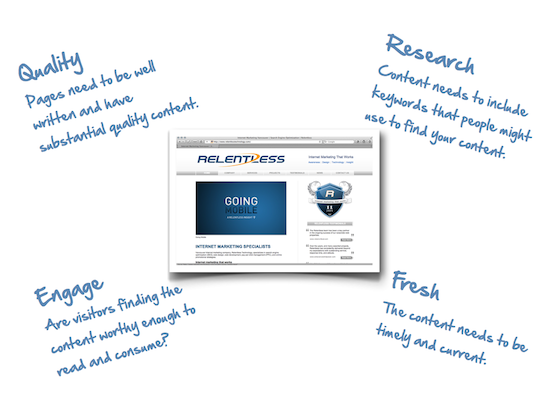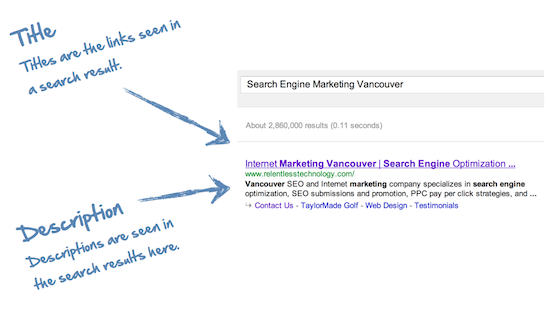Search Algorithms
How do Search Engines Rank Web Pages?
Search Engines use hundreds of ranking factors to determine where to rank the world’s information. A website will be rewarded with high rankings when the right combination of factors exist.
There are two broad categories of ranking factors that will propel your website into higher rankings; on-page factors and off-page factors.
On-Page Ranking Factors
These types of ranking factors are in direct control of the publisher or owner of the website. The content, coding, and architecture of your website all play a large part in how well you can compete in the search results.
Content
What is your website all about? The content and words used in the content of your website determine what the website is all about.
Quality
The pages on your website need to be well-written and be of substantial quality for the search engines to score the site well. The content needs to be written for humans, not machines.
Research
Using keyword research, we can determine historical search volume for your industry and niche. The goal is to use words or phrases that are actively being searched by people looking for your type of content.
Words
The keywords used in your content play an important role for search engines to determine relevance, but also to ensure you are going after the ideas and themes that your target audience is looking for.
Engage
Search Engines want to make sure that visitors are not only finding what they are looking for, but also that the content they are finding is useful and relevant to the search query. If your visitors are bouncing off your site right away, perhaps the content isn’t of a good enough quality. The better your content, the more engaged your visitors will be.
Fresh
Writing content that is relevant and up-to-date is important for search engines, especially in fast-moving and advancing industries. Because of this, having an active content strategy is important for search engine success.
Coding
Websites are built using coding languages. There are coding standards in place that enable your website to be read by browsers, and crawled properly by search engines. Following these standards can have a positive impact on the performance of your website in the search engines.
Titles
The titles of your pages need to reflect the content of the page as accurately as possible, and contain the most relevant keywords that users are using to seek out information.
Descriptions
Meta descriptions are snippets of code that are seen by the search engines and can be displayed directly in the search results page to give the searcher a sense of what the page might be about. These need to be compelling, descriptive, and entice the searcher to click through to the page.
Architecture
The way your site architecture is built is important for better user navigation and search engine indexing. When a search engine crawls your website, it follows links from one section to another. The more topically structured your website is, the easier it is for the search engines to determine hierarchical organization.
Crawl
Can search engines easily crawl pages on your site? If your site isn’t organized properly, the search engine bots might hit dead ends where it can’t make it’s way to the next section, potentially leaving valuable pages uncrawled.
Page Speed
Is your website coded well enough to allow quick load times and quick crawls from the search engines? Read more about the importance of page speed.
URLs
The URLs of your web pages need to be properly named according to hierarchical organization and contain relevant keywords to your specific website theme and industry.
Off-Page Ranking Factors
These types of ranking factors are all influenced by readers and visitors of your website, as well as other publishers and social relationships.
Links
Search Engines use links from other websites as a vote of confidence for relevancy. This is similar to how research papers are cited for relevance in universities and educational institutions. The more times a paper is cited as an authority, the more influential that paper might become. The same principle is applied to search algorithms.
Quality
The quality of links from other websites plays a large role in dictating rankings. The better quality links from other websites, the better your website can perform in the search results. Higher quality websites are linked to frequently by other high quality websites.
Text
The anchor text used in links also plays a role. The links pointing to your website should contain words that are relevant to your website’s theme.
Number
The overall number of links pointing at your website is a major ranking factor. The more high quality links that point to your website, the better your website will perform in the search results.
Social
Similar to how links from other websites can show confidence in relevance for rankings, the more people who are talking about your website or sharing your content on social media websites, the more authoritative your website is seen in the search engines.
Reputation
When well-respected people in social media channels share your content or reference your website, the more valuable your website might become.
Shares
The more people who share your website within their social circles, the better your site can perform in the search engines.
Personal
The attributes of the person making a search query play a large role in the outcome of the results.
Country
What country is the search query coming from? This will determine what results are shown based on the likely intent behind the query, language and other factors.
Locality
What city a person is searching from determines what local results are displayed. Google will also make assumptions about a query. For example, if you just type “restaurants” into the search box, Google might display restaurants that are close to you.
Social
Search Engines now try to leverage social data about you. For example they might display websites that your friends have shared if they are relevant to your query.
If you haven’t already, check out our search engine optimization page for more information.
Posted on: 06/07/2012
Updated on: 11/07/2014
Posted by: Craig Hauptman – President & Founder
Related Insights:
Search Traffic: Paid vs. Organic – The Fundamental Differences and How to Leverage Each Type
Mobile Majority – Why a Mobile-First Approach is so Important
The AIDA Model – When to Use Specific Digital Ad Platforms Throughout the Sales Funnel
A/B Testing for Continual Improvements – Split Testing for Incremental Website Improvements
AI Chatbots & Search Engines – How AI Chatbots Will Impact Search Engines






















